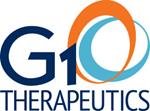G1 Therapeutics to Present Data Showing Myelopreservation Benefits of Trilaciclib in Patients with Small Cell Lung Cancer at the ASCO20 Virtual Scientific Program
- Trilaciclib significantly reduced myelosuppression and need for related supportive care interventions for patients with small cell lung cancer (SCLC) receiving chemotherapy
- New Drug Application (NDA) submission for trilaciclib in SCLC on track for completion in 2Q20
“The data shared at ASCO highlight the significant potential for trilaciclib to improve outcomes for patients undergoing chemotherapy,” said
Myelosuppression is the result of damage to bone marrow cells, and is one of the most common side effects of chemotherapy. Myelosuppression often requires the administration of rescue interventions such as growth factors and blood or platelet transfusions, and may also result in chemotherapy dose delays and reductions. Immune cell damage may decrease the ability of the immune system to fight the cancer, as well as infection. Trilaciclib is a first-in-class investigational therapy designed to preserve bone marrow and immune system function during chemotherapy and improve patient outcomes.
The company plans to complete an NDA submission for trilaciclib for myelopreservation in SCLC in 2Q20. Trilaciclib has been assigned Breakthrough Therapy Designation by the
G1 abstract titles are below; more details are available on the ASCO20 Virtual Scientific Program website.
Title: Myelopreservation and reduced use of supportive care with trilaciclib in patients with small cell lung cancer
Abstract: 12096
Poster Number: 384
Date/Time:
Presenter:
Background/Key Findings:
- Across three separate randomized, double-blind, placebo-controlled Phase 2 trials, 123 patients with extensive-stage SCLC were treated with trilaciclib administered prior to chemotherapy and 119 SCLC patients received chemotherapy alone.
- The addition of trilaciclib significantly decreased measures of myelosuppression and the need for supportive care interventions.
- Fewer patients receiving trilaciclib administered prior to chemotherapy had Grade 3/4 hematologic adverse events (n=54 [44.3%]) compared with those receiving chemotherapy alone (n=91 [77.1%]).
- Statistically significant reductions in the rate and duration of severe neutropenia, administration of G-CSF, Grade 3/4 anemia, and red blood cell transfusions were observed in patients receiving trilaciclib prior to chemotherapy compared with those receiving chemotherapy alone.
- Median overall survival (OS) and progression-free survival (PFS) were comparable between patients receiving trilaciclib prior to chemotherapy and those receiving chemotherapy alone.
Title: Real-world burden of chemotherapy-induced myelosuppression: results of a
Abstract: e19299
Authors:
Background/Key Findings:
- 301 people with cancer (breast cancer = 153, lung cancer = 100, colorectal cancer = 48) who were treated with chemotherapy in the past year and experienced at least one episode of myelosuppression completed an online survey to assess the impact of chemotherapy-induced myelosuppression.
- Nearly nine in ten (89%) survey participants reported that myelosuppression had a moderate or major impact on their lives (moderate life impact = 49%, major life impact = 40%).
- Fatigue was the most commonly reported side effect of chemotherapy, experienced by almost three-quarters of survey participants (72%), with more than half (55%) rating it as highly bothersome (9 or 10 on a 1–10 scale of ‘bothersomeness’).
Additional data from this survey will be presented at the Virtual ISPOR 2020 meeting of the
Title: Real-world burden of myelosuppression in patients with small cell lung cancer: retrospective, longitudinal data analysis.
Abstract: e19300
Authors:
Background/Key Findings:
- Data from
Providence St. Joseph Health electronic medical records over a three-year period (January 2016 -December 2019 ) were analyzed to assess hematologic adverse events, treatment patterns, and hospital-based healthcare resource utilization and treatment costs of 347 SCLC patients who had chemotherapy-induced Grade 3/4 myelosuppression. - The average total 12-month cost of care for SCLC patients without Grade 3/4 hematologic events was
$67,802 . Average annual cost of care was higher for SCLC patients experiencing Grade 3/4 hematologic events:$131,047 for those with neutropenia,$95,954 for those with anemia, and$90,053 for those with thrombocytopenia.
About Trilaciclib
Trilaciclib is a first-in-class investigational therapy designed to improve outcomes for people with cancer treated with chemotherapy. Trilaciclib has received Breakthrough Therapy Designation based on myelopreservation data from three randomized, double-blind, placebo-controlled clinical trials in which trilaciclib was administered prior to chemotherapy treatment in patient with small cell lung cancer (SCLC). In a randomized trial of women with metastatic triple-negative breast cancer, trilaciclib improved overall survival when administered in combination with chemotherapy compared with chemotherapy alone. In 2020, the company plans to complete a New Drug Application (NDA) submission for trilaciclib for myelopreservation in SCLC, initiate a registrational Phase 3 clinical trial in colorectal cancer, and begin a neoadjuvant trial in breast cancer as part of the I-SPY 2 TRIAL.
About
Contact:
Senior Director, Investor Relations & Corporate Communications
919-907-1944
jmacdonald@g1therapeutics.com
Source: G1 Therapeutics

